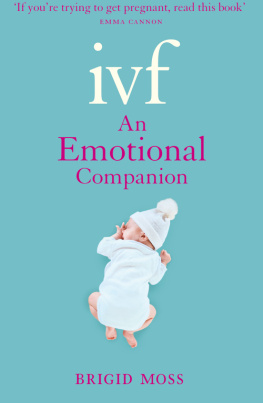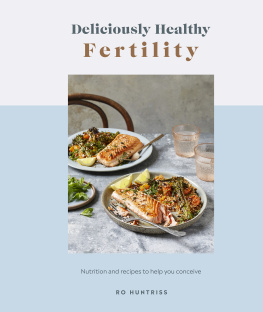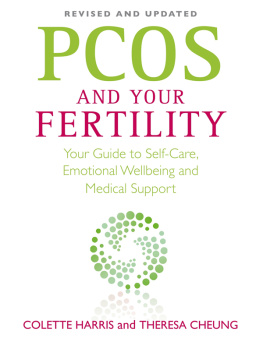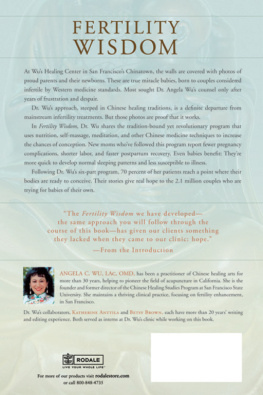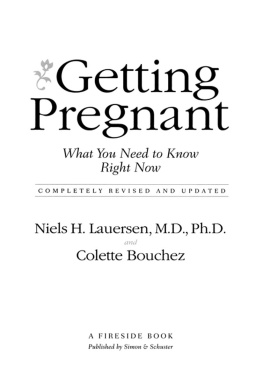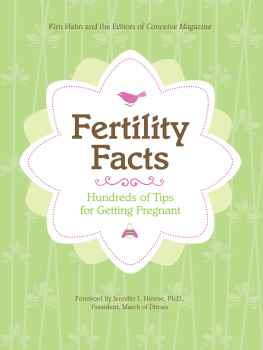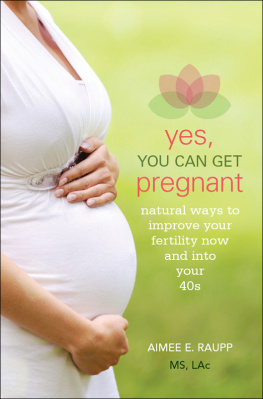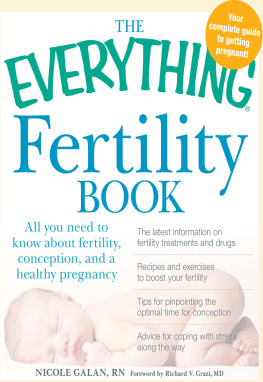ivf
An
Emotional
Companion
BRIGID MOSS

Contents
I dont know how long youve been trying for a baby, which fertility investigations or treatments youve had or what your chances are now of getting pregnant. You could just be thinking about having IVF, you might be a veteran IVF-er whos had multiple cycles, or you may be about to start out on your first cycle. Wherever you are on your IVF journey, this book is for you.
If I think back, I can still remember the feelings of inadequacy, shame and loneliness that I had when I couldnt get pregnant. That was my motivation for writing this book, a collection of stories from 22 amazing women who are sharing them because, like me, they remember how it feels to be among the one in six couples who experience infertility. Each one of them volunteered to tell her story because she wanted to let you and others know that IVF can be hard, but that you can get through it.
When I was first told Id need IVF, almost six years ago, aged 35, I couldnt talk to anyone about my fertility problems. Writing this book admitting my infertility to everyone and speaking to the women whose stories are told in these pages has been liberating for me. As one woman said to me, IVF and infertility need to be brought out into the open. Nobody should be ashamed any more.
But back then, I didnt want anyone to feel sorry for me or pity me or gossip about me. I didnt want friends to think they couldnt tell me when they got pregnant easily. And I didnt want my mum to be sad for me or worry about me. Adam, my husband, was a great support because, as a lifelong optimist, he always believed wed have our family in the end.
I loathed the hours spent waiting for fertility appointments in gloomy NHS corridors; and the appointments themselves were gruelling and made me feel very vulnerable. If youve ever had an HSG (an hysterosalpingogram, which examines your womb and Fallopian tubes using a dye that shows up when your abdomen is X-rayed), youll know why I walked out of the examination room when I saw the huge machine I was being asked to lie on, naked from the waist down. Most of the doctors were good at explaining things, and kind, but I still felt like crying at every appointment, just because I felt so sad and powerless. There were times when I couldnt face yet another internal examination (one of the women in the book made me laugh when she said, I automatically take off my knickers now as soon as I get into any doctors examination room).
Hormone tests and cycle monitoring showed my cycle was regular and I was ovulating, but the HSG showed my tubes might be blocked. Two years after I first went to the GP, I was booked in for a laparoscopy (a keyhole operation: a camera is put inside your abdomen via an incision under your tummy button). The surgeon discovered my tubes were blocked, and that I had adhesions, bands of tissue stuck to my internal organs, possibly due to a pelvic inflammatory disease that Id had a few years earlier. Your tubes are so tiny and delicate, they can easily be damaged by infection and by adhesions.
At this point, I was finding it hard to concentrate on anything but my fertility. I could cope pretty well with seeing pregnant friends (of course, this was the exact time lots of friends chose to procreate), but I was beginning to feel bitter towards innocent pregnant strangers in the street. Infertility brought out the nastiest part of me, and altered my perception of the world, so that having a baby became the only thing that counted. I spent hours obsessing over the next test, the next result, preparing for the next treatment, wondering what might make it work or even if Id magically get pregnant naturally.
The months between NHS appointments dragged on and on. Six months after the first laparoscopy I had another one, this time to clear away the adhesions and attempt to free up my tubes. It didnt work. Another six months later, and I saw another consultant. He looked at my notes, pronounced me a perfect candidate for IVF and referred me on to the NHS IVF waiting list.
I was nervous, as IVF sounded so medical and invasive, but frankly, after three years of blood tests, scans, internals, laparoscopies and waiting, I was relieved to be getting to that next stage. And what was cheering was that although IVF is now used for a whole spectrum of fertility problems polycystic ovaries, failure to ovulate, endometriosis and malefactor infertility it was actually invented to bypass malfunctioning tubes like mine.
As the NHS waiting list for IVF was a year in our area at the time, and I was by then 35, we decided wed better get on with having IVF privately. My mum kindly gave us some money towards it, and we scraped together the rest. I went to see fertility expert Zita West, who talked me through the pros and cons of the many London clinics.
Another six months later, I was at my first appointment at the ARGC the Assisted Reproduction & Gynaecology Centre in London. But just when I was ready to start my first IVF cycle, a doctor there scanned me and told me that my tubes were full of fluid due to having been blocked. He said that this could stop the IVF working, as the fluid can go into the uterus and prevent the embryo from implanting. Another gynaecologist agreed and said that my tubes and the adhesions around them were probably causing my awful period pains too. So I had another operation this time to remove my tubes. It was a very final decison to make, and one I have occasionally regretted since. From that point on, IVF would be my only method of ever getting pregnant.
Thats when I first found the Fertility Friends website, which has a forum for the ARGC, among other clinics. At first I just read other womens conversations but one day, once Id finally started IVF, I joined in, asking, What does it mean that my left ovary is showing more follicles [the sacs that contain the eggs] than my right? And, a few days later, Does anyone else feel twinges in their ovaries during stimulation? Or get spotting? I liked that lots of people replied, and everyone supported each other, cheered each other on and commiserated, really knowing what it felt like when things didnt work out. My online fertility buddies were there for me during IVF, at all hours, day or night, ready with a quick boost or supportive comment. One woman who was always helpful on the forum was a GP called Alice, who is still a friend today (and whose story is told in Chapter 12).
It became clear to me that some people who hadnt been through infertility or IVF often didnt get it. Toni (see Chapter 3) explains it like this: People who havent experienced infertility dont understand how it takes over your life, how sad it is that a vision you had of your life has been taken away from you. It was hard having to explain every step in the IVF process to friends and family, even when they were being loving and wanted to support me. I was lucky because at work, my boss and close workmates were kind too, asking me how things were going every day.
The actual treatment was hardcore and physically demanding. At the ARGC, for the roughly two weeks that youre injecting drugs to stimulate your ovaries to produce eggs, you have a blood test every day at 7 a.m., sometimes two, and scans every other day too. I still cant drive near the blood clinic in Harley Street without feeling my stomach tighten. There was a lot of waiting around for scans and appointments at the clinic too. The waiting room was filled with an air of desperation mixed with camaraderie. People were in awe of Mr Taranissi, the head of the clinic, and talked about Mr T. in reverential tones. I joked later that the chairs shouldnt have been around the edges of the waiting room, but all in lines, as if we were praying to Mr T. Often, Id chat to a neighbour about our treatments and Id feel quite lucky, because while I was on my first cycle, others were on their third, even fifth.
Next page
